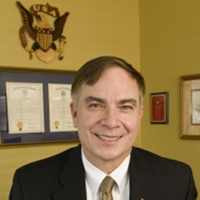Military Times Edge magazine, in its annual Best for Vets survey, ranks Rutgers third among the more than 200 U.S. four-year institutions it surveyed for friendliness to student veterans. Rutgers is one of only two institutions in New Jersey to make the list.
The magazine evaluated schools in four categories: financial assistance, academic flexibility, campus culture, and support services that help veterans make the transition from military to college life. It publishes separate lists for four-year, two-year, and online or nontraditional institutions.
“My colleagues and I are proud of the commitment that Rutgers has made to student veterans,” said Stephen C. Abel, who was hired by Rutgers last year to direct its newly established Office of Veterans Services. “The ranking we received from Military Times Edge magazine clearly validates that commitment.”
Since his arrival, Abel, a retired army colonel and former deputy commissioner in the New Jersey Department of Military and Veterans Affairs, has helped coordinate veterans’ services by creating a single place for student veterans to meet, study, or get help in dealing with government or academic bureaucracies.
Rutgers currently enrolls 926 students who have served in the military – more than double the number of veterans enrolled in 2009.
Rutgers placed 21st in last year’s survey, in which Military Times Edge did not differentiate among four-year, two-year, and online schools.
The university’s jump in rank is exemplified by the experiences of two student veterans, who came to Rutgers from the U.S. Marine Corps about a year apart..
In 2010, Teofilo Bodre, whose photo appears on cover of the October issue of Military Times Edge, was awaiting separation from the Marine Corps and looked forward to going to college. “I always had my eye on Rutgers,” said the North Bergen native, who entered the Marines after graduating from high school in 2004.

But Bodre was still a marine, stationed at the base in Quantico, Virginia. Having been admitted, he discovered that there was a lot of bureaucracy to get through, governmental and academic. “There were so many people to see,” he recalled recently. “You had to deal with the Veterans Administration, and then you had to deal with admissions, and the registrar, and a lot of other people at the university. I didn’t know the area, and I spent a lot of time running around to the wrong places.”
Bodre eventually sorted it all out, but it took considerable patience and persistence.
Since then, Abel and his colleagues have set up headquarters in Veterans House on the New Brunswick campus. There, student veterans can find academic advising, tutoring, psychological counseling, or just a place to meet other veterans. Also, veteran service officers (VSOs) from the New Jersey Department of Military and Veterans Affairs maintain regular hours at Veterans House, and also meet veterans there by appointment.
“When I was applying here, it was before this office really got off the ground, and the difference between then and now is night and day,” said Bodre, a senior majoring in history and political science and a work-study student in Abel’s office.
When Tom Krause, also a marine, was serving as an embassy guard at the U.S. embassy in Kiev, Ukraine, a year after Bodre, he had an entirely different experience. His sister, who attended Rutgers, directed him to the Rutgers office that handles nontraditional students.”They put me in touch with Steve Abel. When I worked the night shift and things were quiet at the embassy, I would call him or email, and he answered all my questions about the university and the VA,” Krause said. “So when I got out, I was ready to start college.”
Krause, from Oakland, is a 23-year-old first-year student who is undecided about his major. Bodre, 25, who was an embassy guard in posts as various as Paris and Islamabad, hopes to follow a diplomatic career. Both men feel a bit different from their younger classmates, but not alienated from them. “There’s a difference between being an 18-year-old freshman and a 23-year-old freshman,” Krause said. “My priorities are different. I appreciate the academics more.”
Bodre believes he already knows who he is, so he’s already gone through the coming-of-age adventures, good and bad, that many people have in college.
“I feel I’m more disciplined than I would have been at 18,” he said. “I almost never miss a class. I have a good grade point average, and people say, ‘Man, you must be smart.’ But I’m not especially smart. I just know what I want to do.”